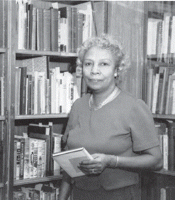2021 Black History Moment: Dorothy Porter, Iconic African-American Librarian
 |
| Dorothy Porter, African-American Librarian at Howard University |
By Russell Lee | Central Library Circulation/Information Desk
Today's 2021 Black History Moment spotlight is on Dorothy Porter, an iconic African-American librarian (May 25, 1905 – Dec. 17, 1995).
Dorothy Porter was a trailblazer who worked at Howard University for 43 years as a librarian, collector and self – described “bibliomaniac.” Her college pedigree included a B.S. degree in 1931 and a M.S. degree in library science in 1932.
Porter was the first African American to graduate from Columbia University’s library school.
She challenged the racial bias of the Dewey Decimal system by cataloging black scholars alongside white colleagues in library collections where she worked. All of the libraries that Porter consulted for this undertaking relied on the Dewey Decimal Classification.
Check out this Library of Congress video about Porter's legendary career at this link
During the early 1900s, books about blacks were cataloged only in two call numbers. At this time period in history, the Dewey Decimal call number for slavery was 326; 325 was used for colonization.
Porter classified works by genre and author to highlight the role of black people in all subject areas, which she identified as art, anthropology, communications, demography, economics, education, geography, history, health, international relations, linguistics, literature, medicine, music, political science, sociology, sports and religion.
Her progressive approach to a systemic problem solidified her as a trailblazer in decolonizing libraries to represent a less Eurocentric way of organizing knowledge. Her perseverance and quest for knowledge inspired her to build one of the world’s leading repositories for black history and culture, Howard’s Moorland-Spingarn Research Center.
Porter also collected books, recordings and artifacts about African-American and African Diaspora Studies to recover understudied archives throughout the world which helped prevent marginalization of research about black people along the lines of nation and language. This testimony of her life spoke to me of how important access and equity is for everyone that uses a library.
To learn more about this extraordinary trailblazer, research Dorothy Porter by accessing some of the Birmingham Public Library’s databases at www.cobpl.org or searching the internet.
Comments